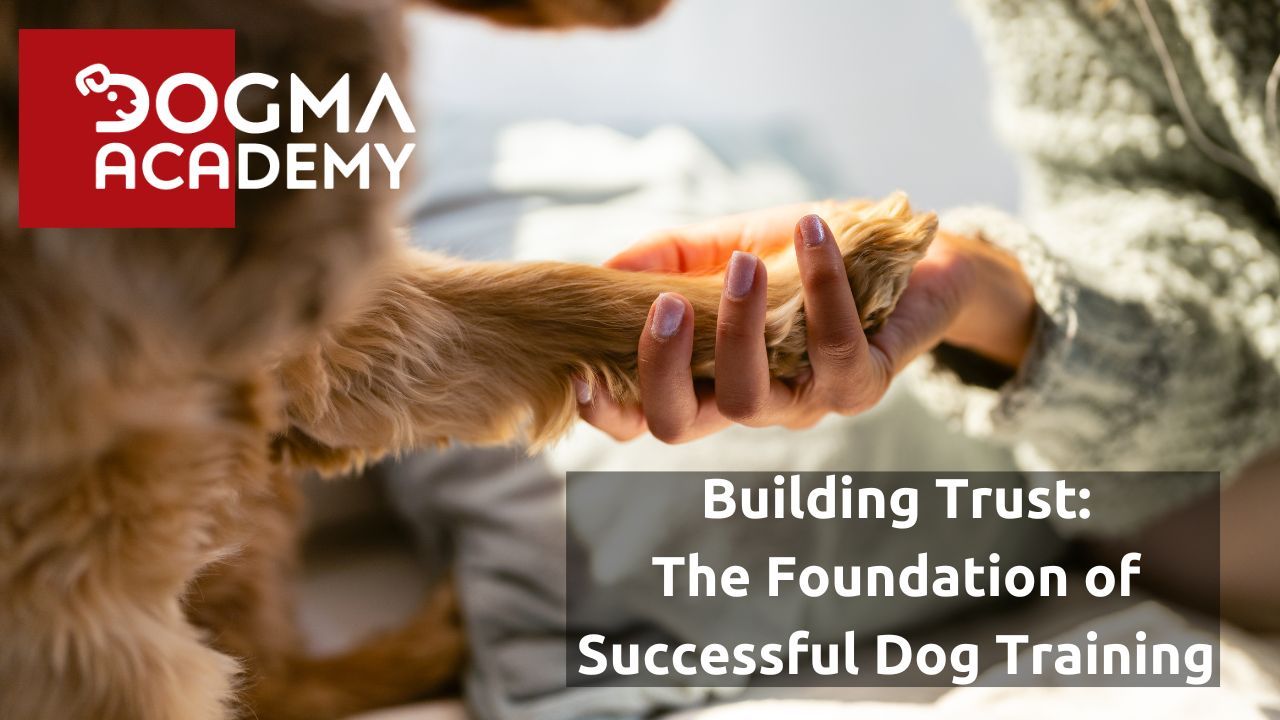Building Trust: The Foundation of Successful Dog Training
Apr 10, 2025
At Dogma Academy, we believe that trust is the cornerstone of every successful relationship, especially with our dogs and with our clients. As trainers, it’s not just about teaching and modifying behaviours; it’s about creating a safe, respectful, and supportive environment where learning can truly thrive.
Whether we’re working with a reactive dog or a nervous and overwhelmed dog guardian, our ability to build trust directly impacts the success of the training process. Let’s explore why trust matters and how to foster it in every interaction.
Why Trust Matters
Enhances Learning and Progress:
When dogs feel safe and understood, they’re more willing to engage, experiment, and offer behaviours. A trusting dog is more relaxed and receptive to learning which are both essential traits for effective learning.
Strengthens the Human-Animal Bond:
Training built on trust fosters deeper connections between dogs and their people. This not only makes training more meaningful but helps create lasting behavioural changes.
Increases Client Confidence and Retention:
Clients who feel respected, supported, and included are more likely to follow through with training, recommend your services, and stay engaged long-term.
Reduces Stress and Reactivity:
For both dogs and people, unfamiliar or uncomfortable situations can trigger stress. When trust is established, you're creating a predictable and positive environment that helps everyone feel more secure.
How to Build Trust with Dogs
Here are a few key strategies for earning a dog’s trust:
Respect Consent and Body Language
Always pay attention to what the dog is communicating. Respecting and listening to signals of discomfort (like backing away, lip licking, or avoidance) helps build a sense of safety. Empower dogs by giving them agency and letting them say "no."
Use Positive Reinforcement
Reward-based training helps dogs associate you with good things. Reinforcement builds confidence, encourages choice, and fosters a healthy relationship.
Be Consistent and Predictable
Dogs thrive on routine and predictability. To start, keeping your movements, tone, and responses calm and consistent helps them know what to expect from you. Creating a predictable environment also helps put them at ease.
Set Them Up for Success
Avoid putting dogs in situations they’re not ready for. Create small, achievable steps to build their confidence and reduce fear.
Handle With Care
Gentle, respectful handling, especially when working on body sensitivity or cooperative care, goes a long way. Let dogs approach you and avoid forcing interactions.
How to Build Trust with Clients
Your human learners need trust just as much as the dogs. Here's how to develop it:
Listen Without Judgment
Meet your clients where they’re at. Create a safe space for them to share their experiences, frustrations, and goals. Avoid blame and focus on solutions.
Communicate Clearly and Honestly
Be transparent about expectations, timelines, and progress. Let clients know what’s realistic and celebrate every win, no matter how small.
Empower Through Education
Help clients understand the why behind the training. When they see the reasoning, they’re more likely to trust your process and stay engaged.
Be Approachable and Supportive
Training can be emotional and challenging on everyone. Offer encouragement and empathy. Your presence and attitude have a huge impact on their confidence and motivation.
Maintain Professionalism and Boundaries
Trust doesn’t mean overstepping. Stay professional, follow through on commitments, and be mindful of your role in the relationship.
Trust isn’t built overnight. It’s earned through patience, empathy, and consistency, and it's the most powerful tool in your toolbox. When you take the time to build trust with both dogs and their people, you’re creating a solid foundation for lifelong learning, growth, and connection, which results in better outcomes for everyone.
Let’s lead with compassion and build relationships that last. After all, great training isn’t just about behaviour, it’s about trust.

